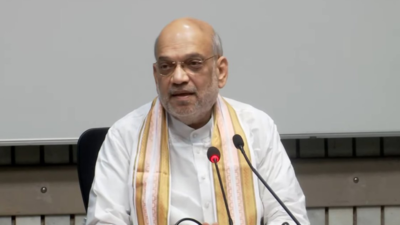- News
- India News
- Focus on 'nyay' instead of 'dand': Amit Shah details 3 new criminal laws
Trending
Focus on 'nyay' instead of 'dand': Amit Shah details 3 new criminal laws
Union home minister Amit Shah highlighted the new criminal laws' focus on justice over penal action, replacing colonial-era legislation. Effective Monday, the Bharatiya Nyaya Sanhita (BNS), Bharatiya Nagarik Suraksha Sanhita (BNSS), and Bharatiya Sakshya Adhiniyam (BSA) modernize India's criminal justice system. These laws replace the Indian Penal Code, Code of Criminal Procedure, and Indian Evidence Act. Shah emphasized that the 15-day police remand remains unchanged, and the first BNS case, a motorcycle theft, was registered in Gwalior.

NEW DELHI: Union home minister Amit Shah, who spearheaded the introduction of the new criminal laws, emphasized on Monday that the new legislation prioritizes the provision of justice, in contrast to the colonial-era laws that focused primarily on penal action.
During a press briefing, Shah said, "First of all, I would like to congratulate the people of the country that about 77 years after independence, our criminal justice system is becoming completely 'Swadeshi'.This will function on Indian ethos. After 75 years, these laws were contemplated upon and when these laws are in effect from today, colonial laws have been scrapped and laws made in the Indian Parliament are being brought into practice."
He further elaborated on the shift in focus, saying, "Instead of 'Dand', it is now 'Nyay'. Instead of delay, there will be speedy trial and speedy justice. Earlier, only the rights of the Police were protected but now, vicitms' and complainants' rights will be protected too."
The three new criminal laws, namely the Bharatiya Nyaya Sanhita (BNS), Bharatiya Nagarik Suraksha Sanhita (BNSS), and the Bharatiya Sakshya Adhiniyam (BSA), came into effect on Monday, introducing significant changes to India's criminal justice system. These laws have been designed to address contemporary social realities and modern-day crimes.
Police remand period continues to be 15 days under Bharatiya Nyaya Sanhita
Amit Shah made it clear that the Bharatiya Nyaya Sanhita (BNS) has the provision of maximum 15-day police custody like the erstwhile IPC and dispelled confusion that the remand period has been extended.
"I want to clarify that in BNS also remand period is 15 days. Earlier if an accused was sent to police remand and he got himself admitted in a hospital for 15 days then there was no interrogation as his remand period used to expire. In BNS, there will be remand for maximum 15 days but it can be taken in parts within upper limit of 60 days," he said.
Shah also clarified that the first case registered under the BNS was at Gwalior in Madhya Pradesh and it was related to a motorcycle theft. He said the case was for a value of Rs 1,80,000.
During a press briefing, Shah said, "First of all, I would like to congratulate the people of the country that about 77 years after independence, our criminal justice system is becoming completely 'Swadeshi'.This will function on Indian ethos. After 75 years, these laws were contemplated upon and when these laws are in effect from today, colonial laws have been scrapped and laws made in the Indian Parliament are being brought into practice."
He further elaborated on the shift in focus, saying, "Instead of 'Dand', it is now 'Nyay'. Instead of delay, there will be speedy trial and speedy justice. Earlier, only the rights of the Police were protected but now, vicitms' and complainants' rights will be protected too."
The three new criminal laws, namely the Bharatiya Nyaya Sanhita (BNS), Bharatiya Nagarik Suraksha Sanhita (BNSS), and the Bharatiya Sakshya Adhiniyam (BSA), came into effect on Monday, introducing significant changes to India's criminal justice system. These laws have been designed to address contemporary social realities and modern-day crimes.
The new legislation replaces the British-era Indian Penal Code, Code of Criminal Procedure, and the Indian Evidence Act. Starting from July, all new FIRs will be registered under the BNS. However, cases filed prior to the implementation of the new laws will continue to be tried under the old laws until their final disposals.
Police remand period continues to be 15 days under Bharatiya Nyaya Sanhita
Amit Shah made it clear that the Bharatiya Nyaya Sanhita (BNS) has the provision of maximum 15-day police custody like the erstwhile IPC and dispelled confusion that the remand period has been extended.
"I want to clarify that in BNS also remand period is 15 days. Earlier if an accused was sent to police remand and he got himself admitted in a hospital for 15 days then there was no interrogation as his remand period used to expire. In BNS, there will be remand for maximum 15 days but it can be taken in parts within upper limit of 60 days," he said.
Shah also clarified that the first case registered under the BNS was at Gwalior in Madhya Pradesh and it was related to a motorcycle theft. He said the case was for a value of Rs 1,80,000.
End of Article
FOLLOW US ON SOCIAL MEDIA











